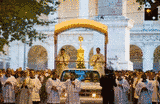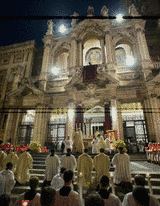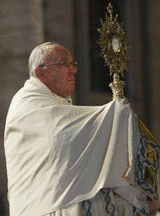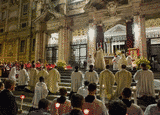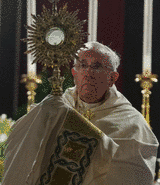Solemnity of Corpus Christi 2014
(Papa Francisco's homily begins at 40 mins 50 secs on the video)
Pope Francis's Homily at Mass in the Piazza of St John Lateran Basilica
before Adoration of the Blessed Sacrament & a Eucharistic Procession to the Basilica of St Mary Major
Thursday, 19 June 2014 - in English, French, German, Italian, Portuguese & Spanish
"“The Lord your God ... fed you with manna, which you did not know” (Dt 8:2-3).
These words from Deuteronomy make reference to the history of the Israelites, whom God led out of Egypt, out of slavery, and for 40 years led through the desert toward the promised land. Once established on the land, the Chosen People attain a certain autonomy, a certain wellbeing, and run the risk of forgetting the harrowing events of the past, overcome thanks to God’s intervention and to his infinite goodness. And so the Scriptures urge the people to recall, to remember, to memorize, the entire walk through the desert, in times of famine and desperation. The command of Moses is to return to the basics, to the experience of total dependence on God, when survival was placed in his hands, so the people would understand that “man does not live by bread alone, but that man lives by everything that proceeds out of the mouth of the Lord” (Dt 8:3).
Besides physical hunger, man experiences another hunger, a hunger that cannot be satiated with ordinary food. It’s a hunger for life, a hunger for love, a hunger for eternity. And the sign of manna — like the entire experience of Exodus — also contains in itself this dimension: it was the symbol of a food that satisfies this deep human hunger. Jesus gives us this food, rather, He himself is the living bread that gives life to the world (cf. Jn 6:51). His Body is the true food in the form of bread; his Blood is the true drink in the form of wine. It isn’t simple nourishment to satisfy the body, like manna; the Body of Christ is the bread of the last times, capable of giving life, eternal life, because this bread is made of love.
The Eucharist communicates the Lord’s love for us: a love so great that it nourishes us with Himself; a freely given love, always available to every person who hungers and needs to regenerate his own strength. To live the experience of faith means to allow oneself to be nourished by the Lord and to build one’s own existence not with material goods but with the reality that does not perish: the gifts of God, his Word and his Body.
If we look around, we realize that there are so many offers of food which do not come from the Lord and which appear to be more satisfying. Some nourish themselves with money, others with success and vanity, others with power and pride. But the food that truly nourishes and satiates us is only that which the Lord gives us! The food the Lord offers us is different from other food, and perhaps it doesn’t seem as flavourful to us as certain other dishes the world offers us. So we dream of other dishes, like the Hebrews in the desert, who longed for the meat and onions they ate in Egypt, but forgot that they had eaten those meals at the table of slavery. In those moments of temptation, they had a memory, but a sick memory, a selective memory. A slave memory, not a free one.
We, today, may ask ourselves: what about me? Where do I want to eat? At which table to I want to be nourished? At the Lord’s table? Or do I dream about eating flavourful foods, but in slavery? Moreover, we may ask ourselves: what do I recall? The Lord who saves me, or the garlic and onions of slavery? Which recollection satiates my soul?
The Father tells us: “I fed you with manna, which you did not know”. Let us recover this memory. This is the task, to recover that memory. And let us learn to recognize the false bread that deceives and corrupts, because it comes from selfishness, from self-reliance and from sin.
Soon, in the procession, we will follow Jesus truly present in the Eucharist. The Host is our manna, through which the Lord gives himself to us. We turn to Him with faith: Jesus, defend us from the temptation of worldly food which enslaves us, tainted food; purify our memory, so it isn’t imprisoned in selfish and worldly selectivity, but that it may be a living memory of your presence throughout the history of your people, a memory that makes a “monument” of your gesture of redeeming love. Amen."
Papa Francesco's words at the Angelus in St Peter's Square
Sunday, 22 June 2014 - in Arabic, English, French, German, Italian, Portuguese & Spanish
"Dear Brothers and Sisters, Good morning!
The feast of the Body and Blood of Christ is being celebrated this Sunday in Italy and in many other countries, often using the Latin terms — Corpus Domini or Corpus Christi. The ecclesial community gathers around the Eucharist to adore the most precious treasure that Jesus left us.
The Gospel of John presents the discourse on the “bread of life”, held by Jesus in the Synagogue of Capernaum, in which he affirms, “I am the living bread come down from heaven; if any one eats of this bread, he will live for ever; and the bread that I shall give for the life of the world is my flesh” (Jn 6, 51). Jesus underlines that he has not come into this world to give something, but to give himself, his life, as nourishment for those who have faith in Him. This our communion with the Lord obliges us, his disciples, to imitate him, making our existence, through our behaviour, bread broken for others, as the Teacher has broken the bread that is truly his flesh. Instead, this means for us generous conduct towards our neighbour thereby demonstrating the attitude of giving life for others.
Every time that we participate in Holy Mass and we are nourished by the Body of Christ, the presence of Jesus and of the Holy Spirit acts in us, shaping our hearts, communicating an interior disposition to us that translates into conduct according to the Gospel. Above all, docility to the Word of God, then fraternity amongst ourselves, the courage of Christian witness, creative charity, the capacity to give hope to the disheartened, to welcome the excluded. In this way the Eucharist fosters a mature Christian lifestyle. The charity of Christ, welcomed with an open heart, changes us, transforms us, renders us capable of loving not according to human measure, always limited, but according to the measure of God. And what is the measure of God? Without measure! The measure of God is without measure. Everything! Everything! Everything! It’s impossible to measure the love of God: it is without measure! And so we become capable of loving even those who do not love us: and this is not easy. To love someone who doesn’t love us…. It’s not easy! Because if we know that a person doesn’t like us, then we also tend to bear ill will. But no! We must love even someone who doesn’t love us! Opposing evil with good, with pardon, with sharing, with welcome. Thanks to Jesus and to his Spirit, even our life becomes “bread broken” for our brothers. And living like this we discover true joy! The joy of making of oneself a gift, of reciprocating the great gift that we have first received, without merit of our own. This is beautiful: our life is made a gift! This is to imitate Jesus. I wish to remind you of these two things. First: the measure of God’s love is love without measure. Is this clear? And our life, with the love of Jesus, received in the Eucharist, is made a gift. As was the life of Jesus. Don’t forget these two things: the measure of the love of God is love without measure. And following Jesus, we, with the Eucharist, make of our life a gift.
Jesus, Bread of eternal life, came down from heaven and was made flesh thanks to the faith of Mary Most Holy. After having borne him with ineffable love in herself, she followed him faithfully unto the Cross and to the resurrection. Let us ask Our Lady to help us rediscover the beauty of the Eucharist, to make it the centre of our life, especially at Sunday Mass and in adoration."
After the Angelus:
"Dear brothers and sisters, this 26 June is the United Nations’ International Day in Support of Victims of Torture. In light of this I repeat the firm condemnation of every form of torture, and I call Christians to commit themselves and to join forces for its abolishment and to support the victims and their families. Torturing people is a mortal sin! A very grave sin!
I send my greeting to all of you, Romans and pilgrims!
In particular, I greet the students from the London Oratory School, the faithful of the Diocese of Como and those of Ormea, Cuneo, the “Coro della Gioia” of Matera, the “Arca” association of Borgomanero and the children from Massafra. I also greet the children from the “Canova” secondary school of Treviso, the cycling group of San Pietro in Gu, Padua, and the “Vivere da Campione” which, inspired by St John Paul II, carried a message of solidarity across Italy.
I wish everyone a nice Sunday and a good lunch. Pray for me! Pray for me and arrivederci!"
